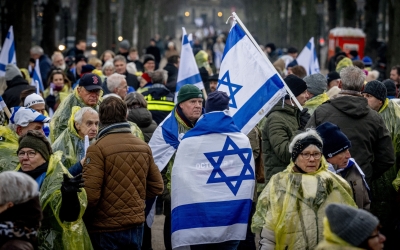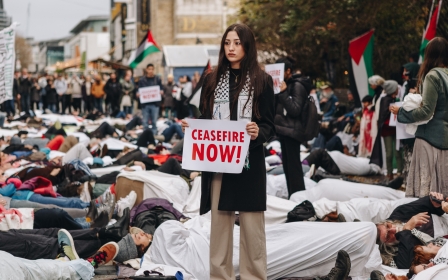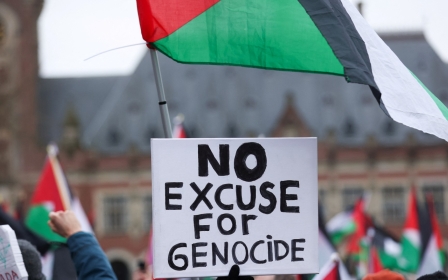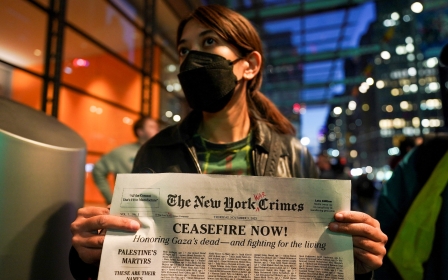How Israel’s genocide in Gaza became a showdown between the West and the Global South
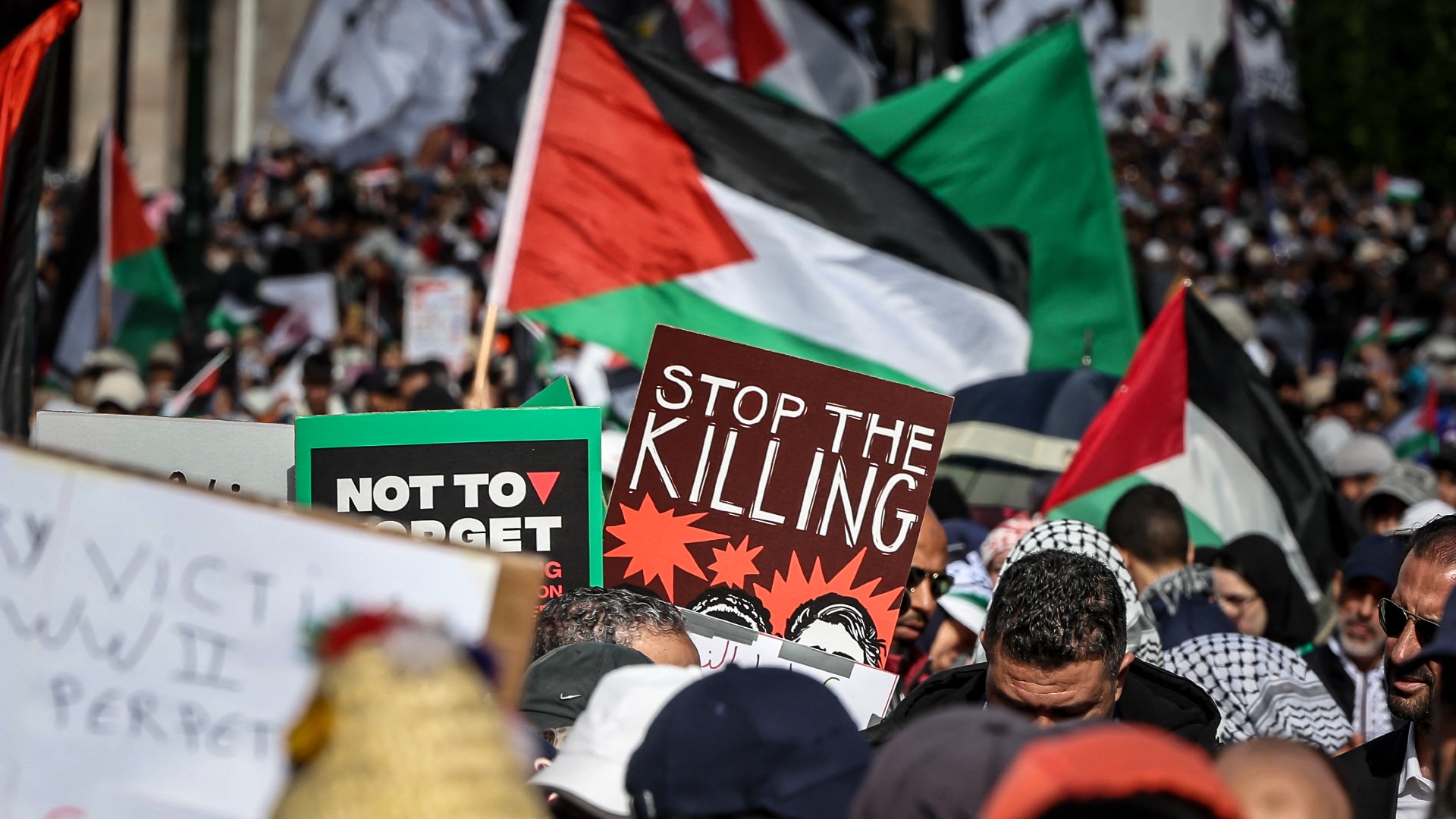
Late last month, the International Court of Justice (ICJ) ruled that it is "plausible" that Israel was committing genocide against Palestinians in Gaza.
In response to the case brought by South Africa, the court ordered Israel to "prevent the commission of all acts" in violation of the Genocide Convention and to "prevent and punish the direct and public incitement to commit genocide" against Palestinians. The ICJ cited the many genocidal and dehumanising statements made by senior Israeli officials, including Israel's president and prime minister.
The ICJ decision places Israel squarely in the company of genocidal white colonial-settler societies. As a result of the interim ruling, the World Court will deliberate further in the coming months or years on whether Israel is committing "genocide".
New MEE newsletter: Jerusalem Dispatch
Sign up to get the latest insights and analysis on Israel-Palestine, alongside Turkey Unpacked and other MEE newsletters
It is a belated investigation of the atrocities that Zionism and the Jewish settler colony have been visiting on the Palestinian people since the 1880s, and more horrifically, as South Africa argued in its case, since 1948, and not only since 7 October 2023.
Historical accusations
While Palestinians have accused Israel of ethnic cleansing since 1948 onwards, Israeli politicians and Israeli and Palestinian scholars have also accused Israel of committing ethnocide, politicide, and "sociocide" against the Palestinian people.
As for genocide, the recent South African case was not the first time such an accusation was made. Shortly after the Sabra and Shatila massacres in September 1982, the United Nations General Assembly passed a resolution condemning the massacres as "an act of genocide", with an overwhelming 123 countries supporting the resolution and only 22 abstentions and no opposing votes.
Follow Middle East Eye's live coverage of the Israel-Palestine war
The white settler colonies of the United States and Canada rejected the term "genocide" and abstained. So did the white settler colonies of Australia and New Zealand and western European colonial countries, including Britain, France, Germany, Italy, Belgium and the Netherlands, among others. In contrast, the Soviet Union declared: "The word for what Israel is doing on Lebanese soil is genocide. Its purpose is to destroy the Palestinians as a nation."
Since the beginning of Israel's transformation of Gaza into a concentration camp, accusations of Israel as a genocidal country became ubiquitous
The German Democratic Republic also accused Israel of committing genocide, as did Cuba and Nicaragua. The Nicaraguan delegate marvelled at how "a people that suffered so much from the Nazi policy of extermination in the middle of the twentieth century would use the same fascist, genocidal arguments and methods against other peoples".
An independent international commission composed of international jurists investigating Israel's crimes in Lebanon also recommended in early 1983 that "a competent international body be designed or established to clarify the conception of genocide in relation to Israeli policies and practices toward the Palestinian people".
Ever since the beginning of Israel's transformation of Gaza into a concentration camp in 2005-2006 and the incarceration of more than two million Palestinians inside it, accusations of Israel as a genocidal country became ubiquitous.
Aside from the Palestinians themselves, Venezuela's President Hugo Chavez, for example, labelled Israel's bombing of Gaza in 2008-2009 as "genocide". In the wake of the Israeli murder of more than 2200 Palestinians in its war on Gaza in 2014, Bolivian President Evo Morales accused Israel of genocide, as did dozens of Holocaust survivors and hundreds of descendants of Holocaust survivors.
'In good company'
Since at least 2008, international scholars have also accused Israel of genocide against the Palestinians in scholarly journals for atrocities committed in 1948 and beyond.
Israel and its apologists have always denied these charges vehemently. In doing so, however, they are in good company with white settler colonies who continue to debate whether their colonisation has been genocidal to indigenous peoples.
Indeed, even European and American scholars have actively contributed to concealing the genocidal practices of white settlers. The prominent German-American philosopher Hannah Arendt emphasised in 1951 that the English settlers' colonisation of America and Australia, the two continents "without a culture or history of their own", witnessed "comparatively short periods of cruel liquidation because of the natives' numerical weakness".
She went as far as claiming that none of England's nationalist and colonial statesmen "was ever seriously concerned with discrimination against other peoples as lower races, if only for the reason that the countries they were talking about, Canada and Australia, were almost empty and had no serious population problem".
Genocide often accompanies white European settler colonialism around the world. Justification for annihilating the natives for daring to resist the white colonists' theft of their land fills the archives of European colonial thought. This is particularly the case when white settlers encountered resistance on the "frontier" of their colonies, whether in the Americas or Australia.
Referred to as "reprisals" or, in the case of Israel and its western apologists, "retaliation", the colonists' murderous campaigns against the natives remain the cornerstone of western morality. They view the natives' attack on their colonial oppressors as the start of violence and not as a defensive response to colonial theft and oppression.
Western governments have maintained this position, as attested by their vehement support for Israel's genocidal war. This is in addition to the justifications proffered for the annihilation of the Palestinian people by the mainstream western press and the policing, both literal and figurative, of any opinion, especially scholarly, that condemns Israel's atrocities as part of the racist and annihilationist nature of Zionism. The UN General Assembly itself had adjudged Zionism as such in 1975 when it formally defined it as "a form of racism and racial discrimination".
A 'defining moment'
That the recent resolution at the General Assembly calling for a ceasefire was supported by 153 countries and opposed merely by 10 (including Israel and the US), and that the ICJ decision was supported by 14 of its 15 permanent judges, is hardly an accident. This international consensus has been nothing less than a showdown between the white European countries and their white settler colonies on one side, and the rest of the world on the other.
The ongoing genocide of the Palestinians is a defining moment, with white supremacists supporting the genocide of non-white peoples, and the people of the rest of the world who understand Israel to be a genocidal European settler colony, supported by current and former white colonial countries, opposing them.
Appalled by such a condemnation of Israel by the majority of the world, Germany, which has a most illustrious genocidal history, has been at the forefront of countries defending Israeli genocide and insisted on joining Israel's defence as a third party at the ICJ.
It was no accident that Namibia, whose people were the first victims of German genocide, was incensed at Germany's unrepentant support of genocide against the non-white Palestinians: Namibia's president Hage Geingob (who recently passed away) lamented "Germany's inability to draw lessons from its horrific history," and declared that Namibia "rejects Germany's support of the genocidal intent of the racist Israeli state".
Given West Germany's unceasing diplomatic, financial, and military support of Israel since the 1950s, including the reunified German state's support of Israel's current genocidal war against them, the Palestinian people would be more than justified were they to consider today's Germany as "The Fourth Reich".
A long white supremacist line
As part of their domination of the indigenous population whose lands they usurped, white settler colonies always adopted a whites-only immigration policy.
The "white Australia" policy on immigration, introduced in 1901, was strictly applied until 1973. New Zealand's whites-only policy for immigration, introduced in 1947, was not abolished until 1987 (though it was modified in 1974). Canada's overtly racist immigration policy persisted till 1962. South Africa's racist immigration policy persisted till the fall of apartheid in 1994.
There are ongoing debates today on the fate of the Palestinians and how best to defeat their struggle while safeguarding Jewish racial supremacy in Palestine
The white supremacist understanding of the US republic became law in 1790 in the first Naturalisation Act, which limited the right to citizenship to any "free white person" resident in the country for two years and their children under the age of 21. This was supplemented by immigration policies culminating in the racist Chinese Exclusion Act of 1882 (partially repealed in 1943), which excluded most Asians (including Indians and Japanese) and was not fully repealed until 1965.
Israel's enactment of the Law of Return in 1950, which allows Jews anywhere in the world to immigrate to Israel and become citizens - a right it denies the indigenous Palestinian people it expelled and whom these Jews are supposed to supplant - is of a similar order.
Both white conservatives and mainstream white liberals, including the white-dominated western liberal press and university administrations, have always supported these white settler-colonial regimes and their policies towards indigenous people. These institutions, like western governments themselves, now include token people of colour who echo the white liberal line on Israel.
Whenever disagreements arose among them, it was mostly on how best to eliminate the threat of the natives and about the level of cruelty to be meted out to them.
There are ongoing debates today on the fate of the Palestinians and how best to defeat their struggle while safeguarding Jewish racial supremacy in the Jewish settler colony. These discussions are characteristically couched as calls for "peace" and "non-violence" and for ending the "humanitarian crisis" in Gaza. Leading them are the white liberal press and white liberal academics and university administrators, along with their non-white subsidiaries, including at my own Columbia University.
What all this demonstrates clearly is that the world today is divided between two opposing camps: a minority of powerful imperialist white supremacists, conservatives and liberals alike, including token non-white liberals, who support the genocide of the Palestinians and the majority of the people of the world who do not.
The supporters of genocide are shameless and unrepentant. That the ICJ came out against Israel and in support of South Africa has caused them little to no embarrassment.
The views expressed in this article belong to the author and do not necessarily reflect the editorial policy of Middle East Eye.
Middle East Eye delivers independent and unrivalled coverage and analysis of the Middle East, North Africa and beyond. To learn more about republishing this content and the associated fees, please fill out this form. More about MEE can be found here.



